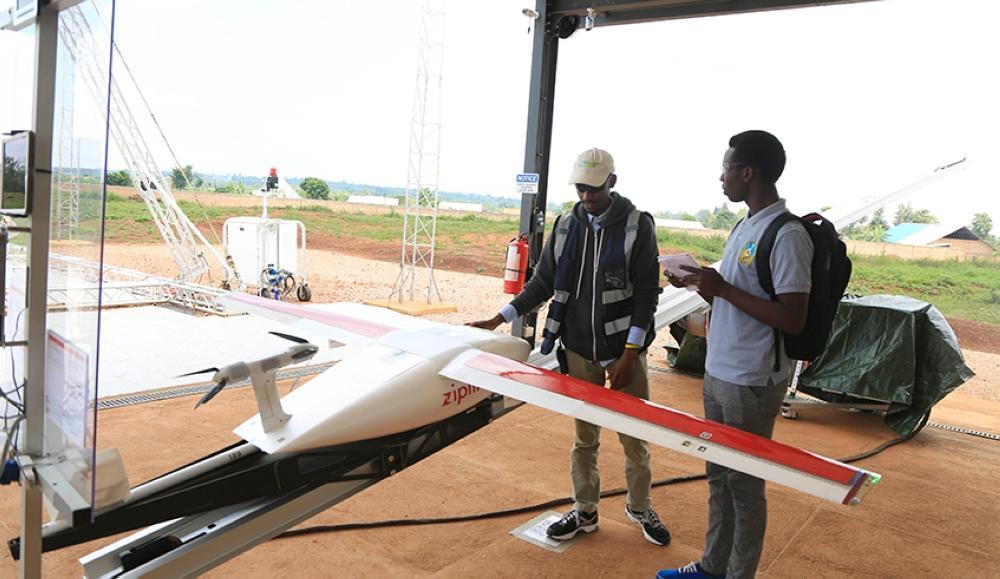Africa-Press – Rwanda. The government is positioning itself as a continental hub for drones or unmanned aerial vehicles (UAVs) for various purposes, with international and local firms, as well as government initiatives converging to advance the industry in the country.
For instance, Czech Republic-based space firm TRL Group, is expanding its footprint in Africa through its Rwandan subsidiary, TRL Space Rwanda, which was founded in Kigali two years ago. The company designs, manufactures, and launches satellites and drones used for agriculture, disaster management, climate change monitoring, and defence.
According to TRL Group CEO Petr Kapoun, the goal is to transform Rwanda into Africa’s satellite and drone centre by 2030.
The company currently employs 10 Rwandan engineers and plans to grow that number to at least 50, along with drone remote pilots.
“We came to Rwanda with the vision of making it Africa’s satellite and drone centre. After two years, we now have a full engineering team. Next year, we aim to begin manufacturing here, so that by 2030 we can deliver complete products made in Rwanda,” Kapoun said.
He stated the company has good cooperation with Rwanda Space Agency and Rwanda Civil Aviation Authority.
TRL Group offers both civilian drones for agriculture and environmental monitoring, with coverage of over 200 km and fully electric systems), and military drones designed for border surveillance and defence operations.
It also has drones which are mainly used for security and military purposes.
The defence or military drones can carry payloads up to 10 kilogrammes, each, reach speeds of 500 kilometres per hour and operate at altitudes up to 6,000 metres (six kilometres). These UAVs are powered by jet engines and can operate autonomously using satellite links and ground radar data.
TRL Group CEO Petr Kapoun at the Aviation Africa Summit & Exhibition, in Kigali, on September 4, 2025, where the firm was showcasing its satellite and drone technology (Emmanuel Ntirenganya)
If a target is detected, the operator can launch the drone with a single command – to reach and hit the target, Petr Kapoun explained.
On how many drones the firm plans to manufacture from Rwanda, he said that will depend on customer demand. In the Czech Republic, the firm currently produces up to 200 units per month, given the scale of its operations there.
Since it wants to use Rwanda as a base to access the African market, “I believe it could be even more. But of course, it will take some time and it will depend on the customers.”
Zipline: From medical supply to urban home delivery
Another major player, Zipline, the US-based unmanned aerial logistics company, is expanding its services in Rwanda. Known globally for pioneering medical drone deliveries – particularly emergency blood supply to remote health centres in Rwanda to save lives – Zipline now plans to enter urban home delivery starting in 2026.
According to Pierre Kayitana, General Manager at Zipline Rwanda, the new service will use a next-generation drone specifically designed for urban logistics.
“Hopefully, in 2026, we should be able to present something to the general public in Kigali where we can do home deliveries. So, we are really excited to complete the test phase and stabilise it as much as possible before we can launch and operate,” Kayitana, told The New Times about the company’s roadmap for rolling out this new technology locally.
Zipline’s success story began in Rwanda and helped it scale globally, becoming one of the most recognized drone logistics companies in the world.
EHang’s self-flying air taxi: An African first
On September 4, 2025, Rwanda became the first African country to launch a self-flying electric air taxi. The event took place during the 2025 Aviation Africa Summit & Exhibition in Kigali and featured a demonstration of the EH216-S, a two-seater electric vertical take-off and landing (eVTOL) aircraft developed by EHang, a Chinese urban air mobility technology company.
The initiative is a collaboration between the Government of Rwanda and the China Road and Bridge Corporation (CRBC). According to the Ministry of Infrastructure, this marks a significant step in Rwanda’s embrace of Advanced Air Mobility (AAM).
According to Rucheng Lu, Chief Engineer of EHang, “that means we start our commercial operation in a new continent,” adding that Rwanda is the entry point for expansion into Africa.
Drones as a tool for transport and defence
The Minister of Infrastructure, Jimmy Gasore, has highlighted the growing importance of drones in both civilian and defence sectors, describing them as a key component of the future of aerial transportation.
Gasore stated that Rwanda has positioned itself as a pioneer in drone technology, especially through its early adoption of Zipline for medical deliveries, including emergency blood supplies to remote health facilities.
He pointed out that Zipline, now a globally recognised company, started its operations in Rwanda.
“When you look ahead, you see that these aircraft – drones – are increasingly being considered for small cargo transport beyond just medical deliveries,” Gasore said, referring to Zipline’s plans to launch home delivery services using new-generation drones.
He also cited the recent launch of the self-flying air taxi in Rwanda, which he said demonstrates the country’s commitment to future-facing innovations in urban air mobility.
“These are examples of innovations that align with Rwanda’s vision for the future, and we are investing significant effort to support them,” he added.
On the topic of defence drones, Gasore acknowledged a growing global trend in their use, saying that nowadays, defence drones are becoming more central to modern warfare.
“They [defence drones] are now discussed more than traditional equipment like tanks. Beyond their economic and civilian benefits, it is clear that they will also play a critical role in the defence sector, offering advantages to countries that adopt them,” he said.
Government support and regulatory framework
Overall, Gasore underscored that Rwanda has created an enabling regulatory environment for the drone industry, which he described as a model for other countries.
“We have put in place clear regulations governing the use of airspace, which simplifies the process for businesses looking to operate drones in Rwanda. This benefits not only investors but also Rwandans,” he said.
Overall, the Government of Rwanda is backing the drone industry through supportive policy and infrastructure. A drone operation centre is being set up – in Huye District, Southern Province – to support growth in the unmanned aircraft sector.
It is expected that the centre, expected to be completed in 2026 to the tune of more than Rwf13 billion, will be receiving drones of all types, including large drones the size of a helicopter, and those with a wingspan of up to 20 metres.
For More News And Analysis About Rwanda Follow Africa-Press






